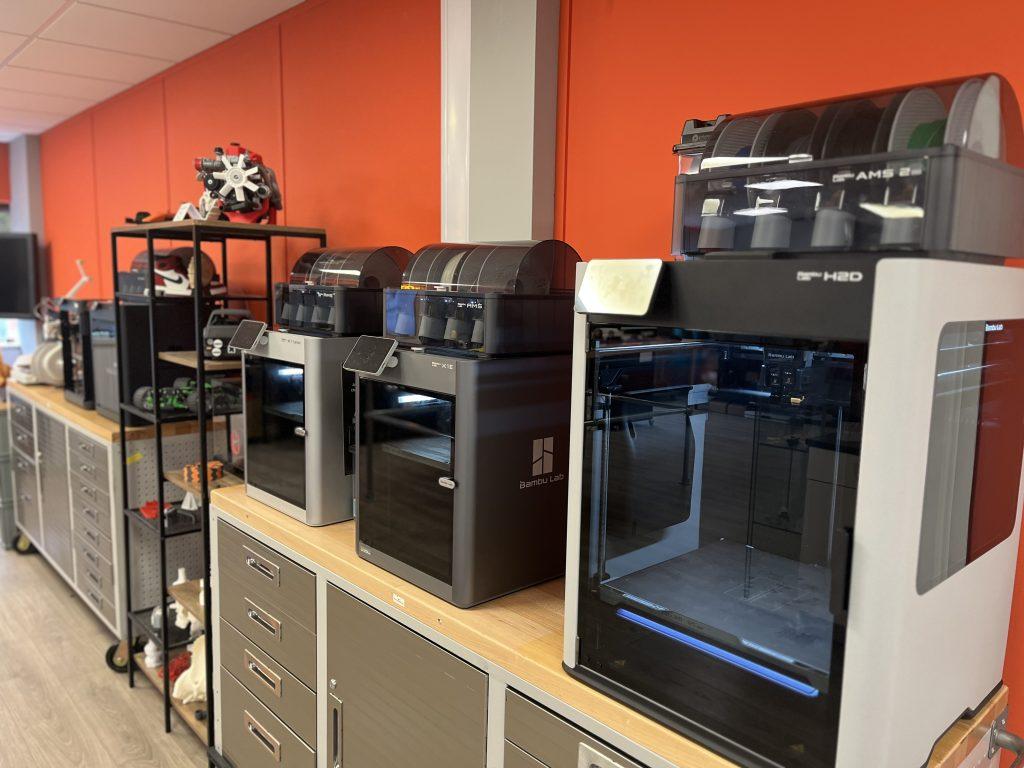All Bambu Lab printers (A1 Mini, A1, P1P, P1S, X1E, X1C, H2D) can print standard PETG and PETG HF for double the default print speeds.
The X1C, X1E, and H2D also print PETG-CF (carbon fibre) out of the box with a hardended steel nozzle, and the A1 series and P1 series are upgradeable with a hardened steel nozzle and hardened steel extruder gear assembly as a workaround to print carbon fibre.
Join us below to learn more about Bambu Lab PETG printing.
Printers in this guide:
- Bambu Lab A1
- Bambu Lab A1 Mini
- Bambu Lab P1P
- Bambu Lab P1S
- Bambu Lab X1E
- Bambu Lab X1C
- Bambu Lab H2D 3D Printer
- Bambu Lab H2D Laser Full Combo 10W 3D Printer
Materials in this guide:
Standard PETG and Bambu Lab
Printer compatibility: A1 Mini, A1, P1P, P1S, X1E, X1C, and the new H2D
Bambu Lab has a translucent PETG line in nine colours (light blue, teal, pink, clear, orange, purple, olive, brown, grey). These are sold as refills or with a spool.
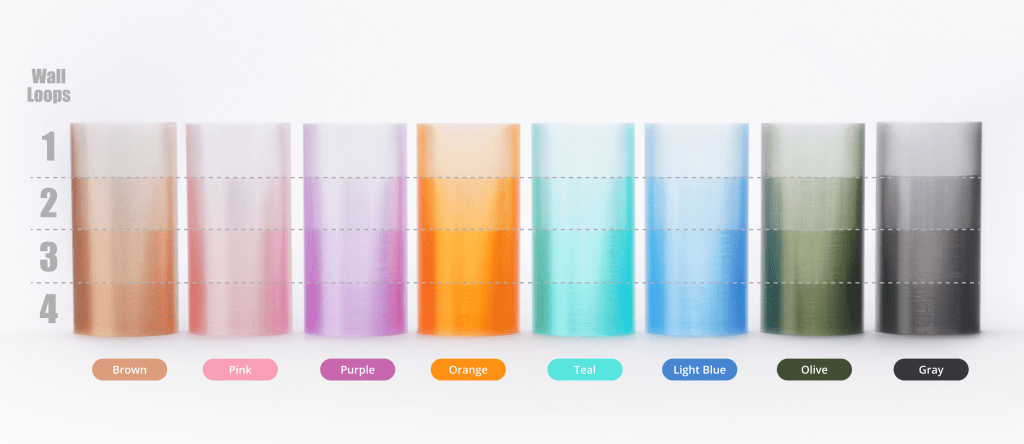
PETG Translucent must be dry, and moisture protection is necessary for printing. Otherwise, prints can develop bubbles that spoil the finish.
Printed to optimal specifications, Bambu Lab PETG’s properties are as follows:
- Tensile strength: 33 ± 4 MPa
- Breaking elongation rate: 8.2 ± 1.3 %
- Bending modulus: 1610 ± 130 MPa
- Bending strength: 68 ± 3 MPa
- Impact strength: 37.4 ± 3.3 kJ/m
We recommend PETG Translucent for impact-resistant, solid builds requiring a decorative finish. Adjusting the perimeter shell thickness, infill pattern and infill density creates different translucencies, letting you build with a visual depth that standard PETG cannot match.
PETG-HF and Bambu Lab
Printer compatibility: A1 Mini, A1, P1P, P1S, X1E, X1C, and the new H2D
Bambu’s PETG-HF shatters traditional PETG speed limitations. It runs at a remarkable 258mm/s preset speed, matching PLA while outpacing standard PETG by 50%.
Where traditional PETG can become visually inconsistent at varying speeds, PETG-HF maintains a sophisticated matte surface throughout acceleration zones.
Its 69°C heat deflection temperature provides 22% better thermal resistance than PLA while delivering 18% greater impact absorption at 31.5 kJ/m².
- Tensile Strength: 34 ± 4 MPa
- Breaking Elongation Rate: 8.6 ± 1.2%
- Bending Modulus: 2050 ± 120 MPa
- Bending Strength: 64 ± 3 MPa
- Impact Strength: 31.5 ± 2.2 kJ/m²
PETG HF is for durable outdoor items, functional parts requiring impact resistance, or anyone wanting faster printing. It’s valuable for automotive components and outdoor toys that withstand environmental exposure and impacts.
PETG-CF and Bambu Lab
Printer compatibility: X1E, X1C, H2D, and P1S (with upgrades)
Bambu’s PETG-CF delivers enhanced structural properties without sacrificing PETG’s processability, achieving print speeds of 200mm/s with drastically reduced nozzle adhesion.
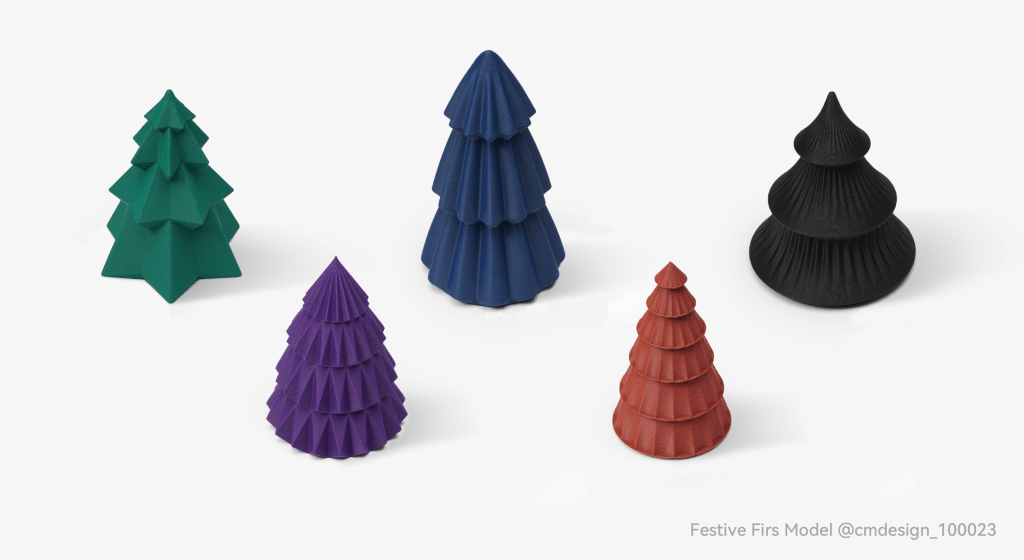
Unlike pure PETG, the carbon-reinforced variant offers 41% greater impact resistance (41.2 kJ/m²) and 40% higher rigidity (2910 MPa bending modulus) while maintaining compatibility with hardened steel nozzles.
- Tensile strength: 35 ± 5 MPa
- Breaking elongation rate: 10.4 ± 0.6%
- Bending modulus: 2910 ± 260 MPa
- Bending strength: 70 ± 5 MPa
- Impact strength: 41.2 ± 2.6 kJ/m²
PETG-CF excels for precision mechanical parts requiring dimensional stability under load, such as drone frames, automotive components, and robotics elements. Its superior heat deflection temperature (74°C) and resistance to impact deformation make it the ideal choice for advanced functional prototyping.
Compatibility note:
The A1 and P1 series come pre-installed with a stainless-steel nozzle, which isn’t recommended for filaments with hard particles like carbon fibre. You need to upgrade to a hardened steel nozzle to print PETG-CF.
A quick rundown of Bambu Lab 3D printers
A1 series
Bambu Lab’s A1 offers full-auto calibration, high-speed printing, and a generous 256mm³ build volume at an accessible price point. The printer features reliable multi-colour capability when paired with the AMS Lite accessory.
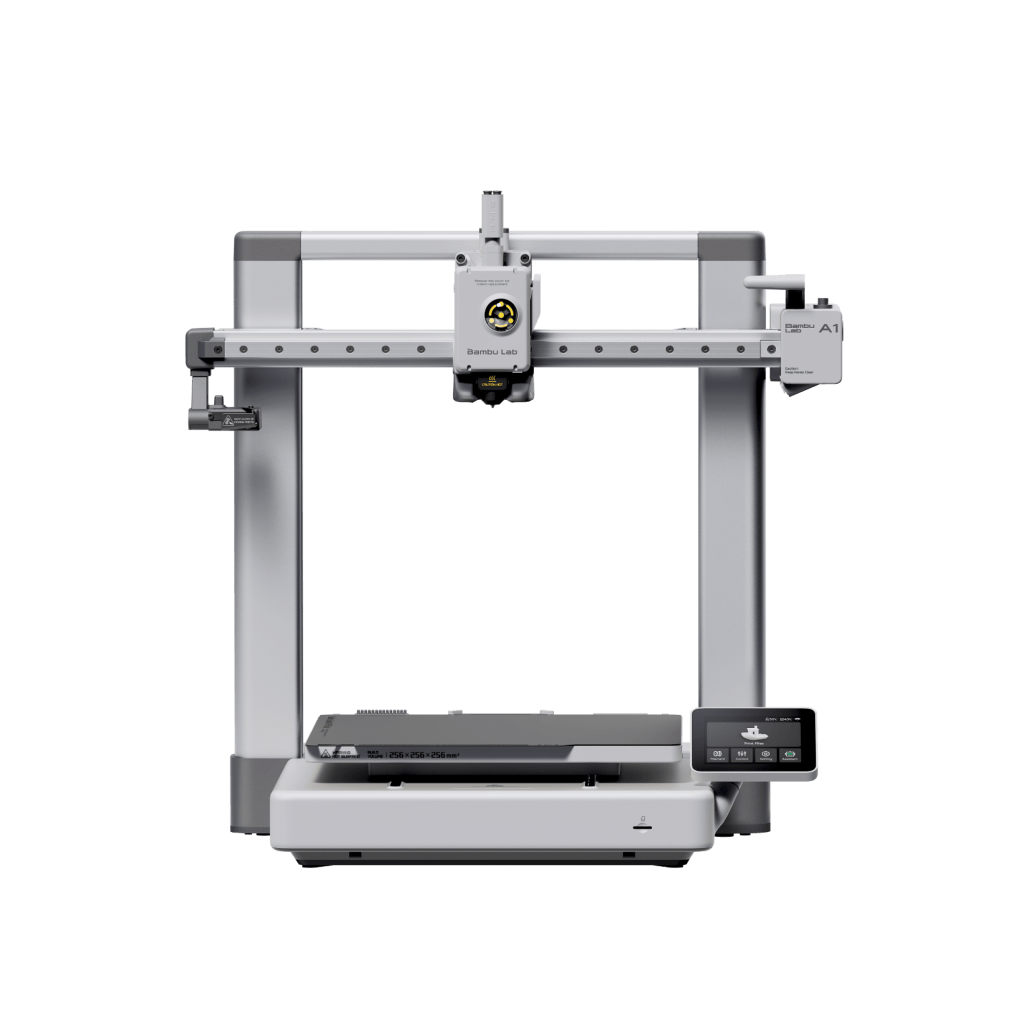
The A1 Mini is a smaller version of the A1, with a 180×180×180mm build volume compared to the A1’s 256×256×256mm build space. It has the same auto-calibration, 500mm/s maximum speed, and compatibility with the AMS Lite for multi-colour printing capability.
P1 series
The P1 series features CoreXY architecture with high 20,000 mm/s² acceleration and 500 mm/s maximum speed. The mechatronics are a step up from the A1 series, providing a more reliable and consistent printing experience.
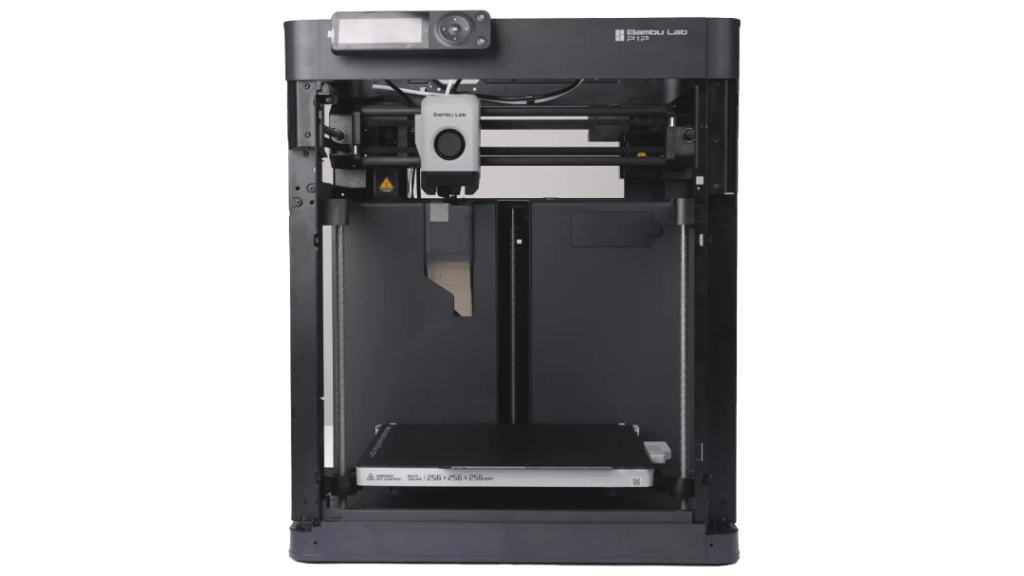
The P1P (open frame) and P1S (enclosed) models offer identical 256×256×256mm build volumes, direct-drive extruders, and automatic bed levelling. They can also print up to 16 colours with AMS integration.
X1 Series
The X1 series is Bambu Lab’s premium CoreXY printers. It has 20,000 mm/s² acceleration and AI-powered features, including micro-lidar first-layer inspection and spaghetti detection, for a professional-grade workflow.
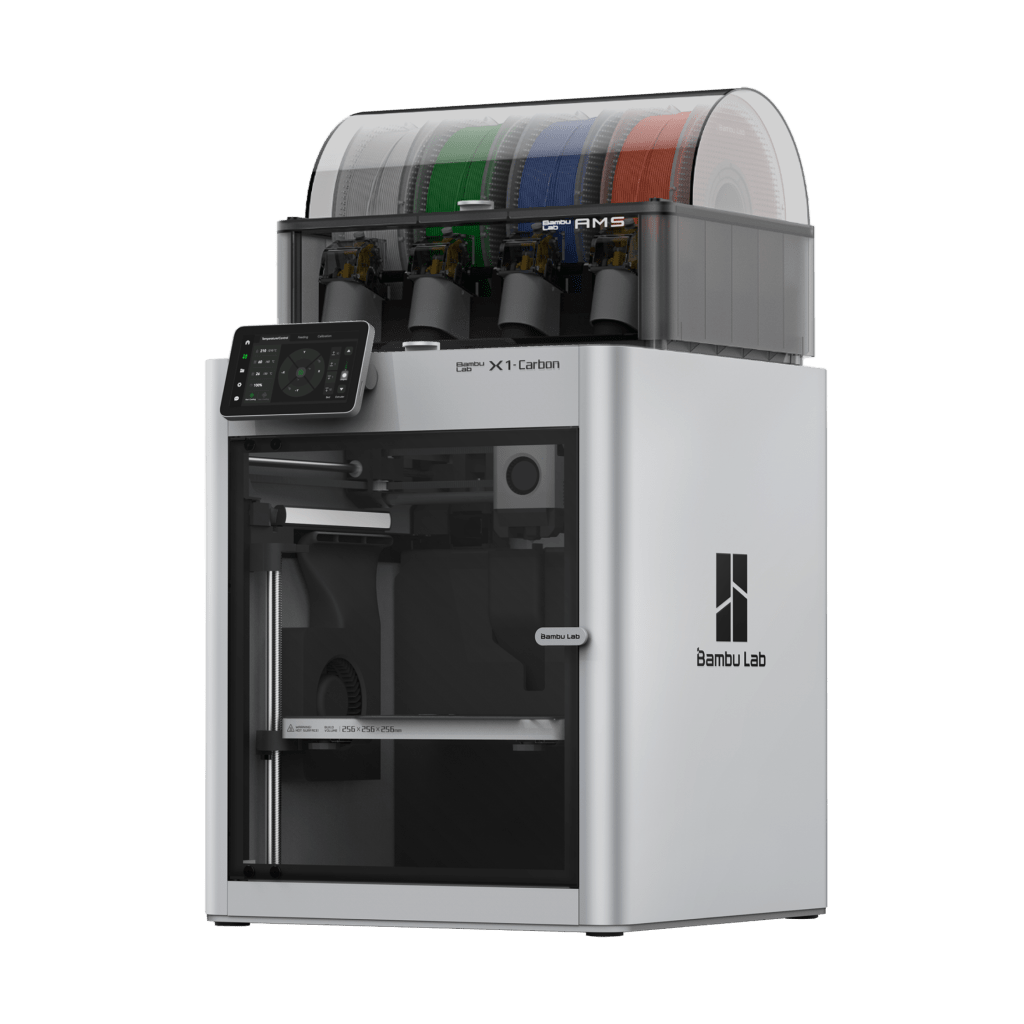
The X1C and X1E have an aluminium and glass enclosure, and hardened steel components optimised for carbon/glass fibre reinforced polymers.
H2D
The H2D is Bambu Lab’s integrated personal manufacturing hub, combining 3D printing, laser engraving/cutting, and digital plotting in one machine.
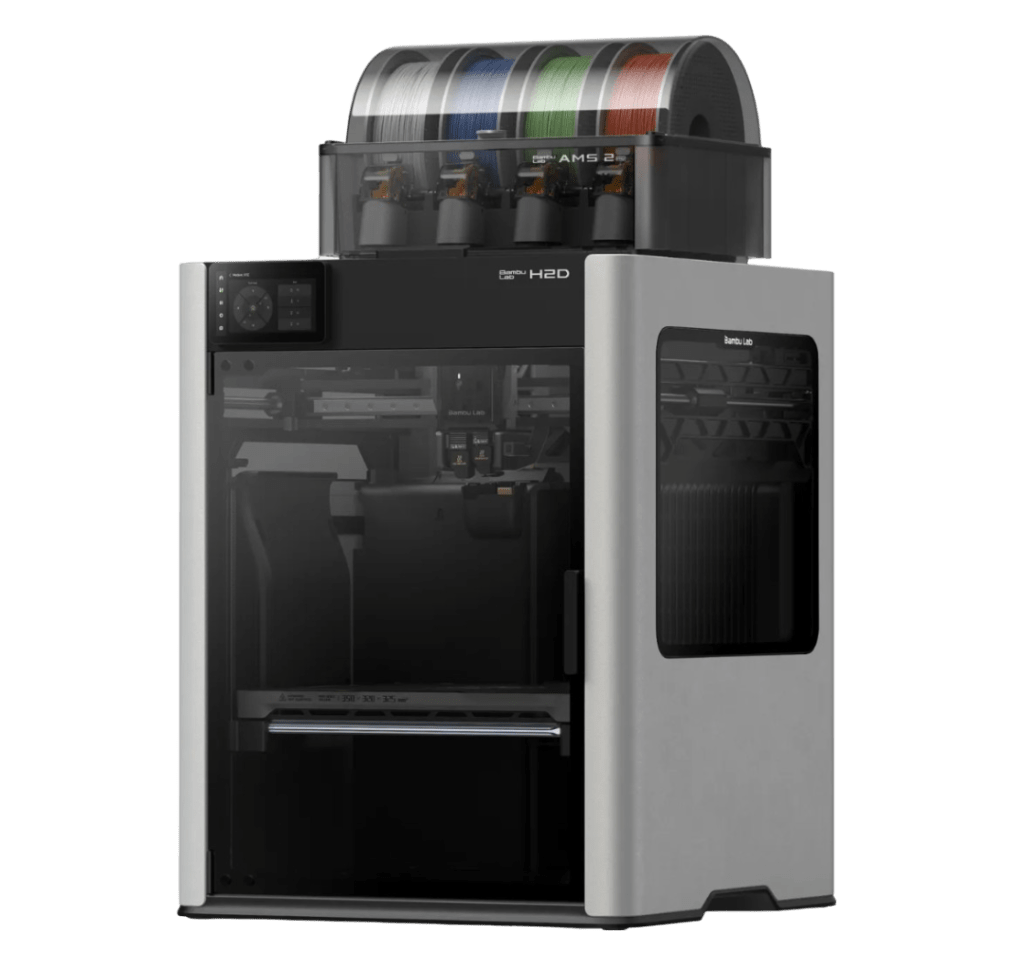
Its dual-nozzle system achieves unprecedented <25μm offset accuracy while supporting multi-material printing with a 350°C hotend and 65°C chamber temperature.
With Vision Encoder technology, the H2D delivers 50μm motion accuracy across its generous 350×320×325mm workspace.
It also includes flame detection, emergency stops, and adaptive airflow management for optimal performance with various materials and operations.
Find out more
Choose Additive-X as your preferred Bambu Lab consumables seller. Our team of technical experts is on hand to help you with any queries. Call 01765 694 007 to chat about Bambu Lab printers today.




